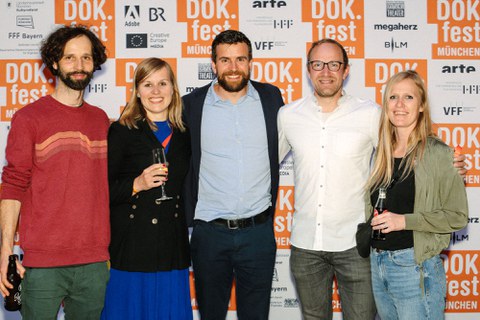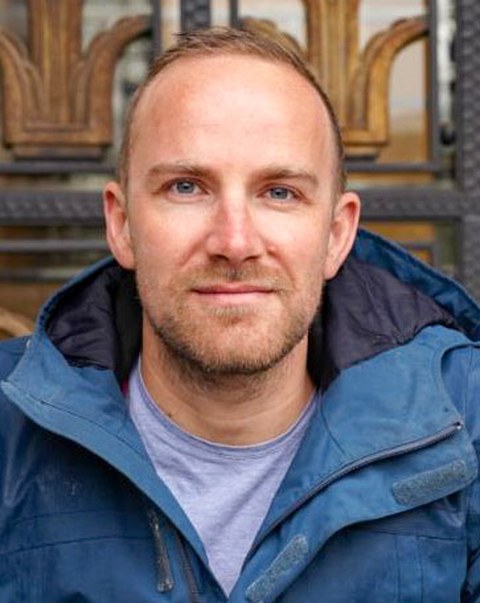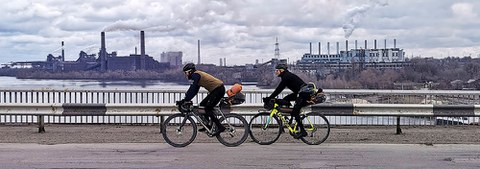Stories from a cycling enthusiast
(interview from 2022)
Susann Mayer
By studying political science, sociology, as well as modern and contemporary history, Markus Weinberg laid the foundation for his current editorial work. He was usually successful in combining his love for cycling with his professional goals. For his film “Jonas Deichmann - das Limit bin nur ich” (Jonas Deichmann - I am the limit), he accompanied an extreme athlete as he completed quite possibly the most spectacular triathlon - namely once around the world - in the midst of the pandemic.
An interview about his career, background insights into the film, his opinion about his studies and his recommendations to prospective students.
Mr Weinberg, you studied political science, sociology, as well as modern and contemporary history at TU Dresden. This begs the question, how did you end up getting into film making?
I have always loved telling stories, I just hadn’t found the right medium yet. The fitting opportunity came along at MDR Television, just as I was finishing up my studies. I was a competitive athlete (professional racing cyclist) during my studies and was given the task of reporting on a professional race in Africa for MDR. This marked my start as a freelance editor, so to speak.
The film business is a tough one, or so it is said, especially in Dresden. Have you found a niche for yourself?
I have indeed found a niche and have managed to exploit it in a few different ways. What I mean by this is that I can tell my story using photos, text or video. You don’t often find this mix. My next stop in journalism was a two-year stint at the Dresdner Morgenpost, including Mopo24, which is now called tag24. Those were exciting years, where I had a lot of freedom to express myself through different media and really get to grips with the fundamentals. I also learnt to spot stories and summarize them concisely. Today, my favorite way to tell these stories is with a documentary. There is definitely room for this in Dresden and there is a small but active group of people here.
One of your films focuses on the NGO The Lifeline Mission, the founder of which, Axel Steier, is a TUD alumnus of philosophy and, like you, a member of the TUD alumni network. Coincidence or acquaintance?
The film “The Lifeline Mission” was actually my first film to make it to theaters nationwide and was also successfully screened at international film festivals. I met Axel Steier when I was an editor at the Dresdner Morgenpost. The initiative “Dresden Balkan Konvoi” had just been founded and was calling for donations. Axel was assigned to me as an interview partner. I stayed in contact with him as the newspaper had repeatedly reported on this initiative and the Balkan escape route. At one point, he came back from Greece with the idea of founding an association with the goal of buying a ship to save people from drowning in the Mediterranean. I captured the story on camera from the get go. In cooperation with the Dresden-based film production company ravir film GbR, I was really able to bring the documentary to life. This achievement marked the start of my career as an independent film maker.
How did you find the topic and protagonist of your current film? How much of the topic comes from you?
I am still very passionate about cycling. Whether I get involved as volunteer at the Dresden Sports Club or go on cycling adventures by myself, I like to report on the trips and tours, or make films. My film “Heading East - Abenteuer TransOst” (Heading East - Adventure TransEast) had its premiere in 2019 at the university cinema “Kino im Kasten”. In addition, I run the sports and events agency “usp management UG” with a friend, through which we organize cycling races in Saxony, such as the “MTB Marathon Dresden” (next race Whit Monday, June 6, 2022, Dresdner Heide). The MTB touring brand “TransOst” is part of this, as well as the gravel brand “Dirty Gravel”, among others.
While attending the many events associated with cycling, I ended up meeting Jonas Deichmann at the 2019 Cosmo Bike Show. We clicked straight away. I was fascinated by his unusual story, even by the stuff that wasn’t to do with cycling, as well as by his personality. His new idea to start a “triathlon around the world” was the icing on the cake which inspired me to make a film about him. Of course, it would involve me accompanying him on the bike - and a bit by boat or while running in Mexico. Work, adventure, passion all rolled into one - it was perfect.
What (professional) plans do you have for the future?
At the moment, I’m very concerned about the war in Ukraine. It was only a year ago that I cycled through the country while filming with Jonas Deichmann. A few weeks ago, I was asking for donations and was bringing medicine into the country, while at the same time reporting on this using different media. I am overjoyed that The Lifeline Mission has now taken it upon itself to continue delivering medicine because this is really important. In the next few weeks, I will be very busy with my feature film “Jonas Deichmann - Das Limit bin nur ich”. The film had a very successful premiere tour over the last few days and will be released in cinemas across Germany on Thursday, May 19, 2022. (In Dresden, the film will be shown on May 19 in the Schauburg, Zentralkino and Thalia, as well as on July 27, 2022 at the Film Nights on the banks of the River Elbe)
Alongside ravir film and the former singer of Polarkreis 18 (Allein, Allein), I am directing a ten-part film series: “What does home sound like”. The next cinematic adventures are already on the horizon. In June, I will shoot a short documentary in the USA and a book will be published on the topic. And another political documentary is currently also in the making. But I’m most looking forward to my first fictional film, which is slowly taking shape (a film about doping in the GDR, the punk movement and the fall of the Berlin Wall).
There’s also quite a lot going on in Saxony to do with cycling at the moment, so my colleague David Lippmann and I are not struggling for ideas.
The thematic mix of politics, culture and sports will most likely accompany me for many years to come.
Were you able to benefit from your studies in your current job? If yes, how exactly?
My studies paved the way for everything I have achieved to date. Even though I sometimes had to take a deep breath and shake off the urge to drop out. I was living in Los Angeles in 2008 and was racing as a professional cyclist. A dream life on the beach in Santa Monica while pursuing professional sport. Today, I’m happy to have made the transition from the USA and to have finished my studies. My studies were also the perfect foundation for my storytelling. The sailing and skippers licenses I was able to get at TUD (I was a cycling instructor for the university sports department) were worth their weight in gold for the film shoot with Jonas Deichmann.
Do you still have ties to TUD? If so, what kind exactly?
We still organize university cycling championships in cooperation with TUD. I’m also always happy to get to sit in the lecture hall at the annual Bergsichten film festival, or when films or programs of mine are shown at TUD. Even during my time as a journalist, I wrote about university topics time and again. I also have friends and acquaintances who work at the university, and, without the students, we wouldn’t be able to hold many sporting events.
Looking back, what advice would you give to prospective or current students?
I would say that there is always a way to follow your dreams, and to be able to combine things. I’m aware that today’s Bachelor’s/Master’s programs don’t quite offer as much freedom as the Magister program did for me back then, but as far as I know, there is still a top sports agreement between TU Dresden and the Olympic Sports Association that I benefited from and which offered me opportunities to better combine my studies and sports at TUD. That being said, one of the best decisions I ever made was to finish my studies. Even though his was a great effort and, instead of doing sports I had to - or better said - was able to earn some money at the Hellerau theater. Without my degree, I would have had to fight much harder for everything. Why am I telling you this? Because many job opportunities at the start of my professional career started out with the question: Do you have a degree?
Thank you for taking the time to chat with us today! And the best of luck with your film and all of your upcoming projects!
Contact:
Markus Weinberg
Editor // Video Journalist // Filmmaker
Tel.: +49(0)172 3520648
Link to the film: www.jonasdeichmann-film.com



